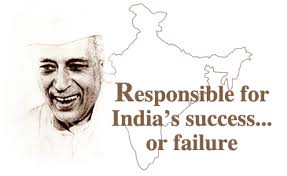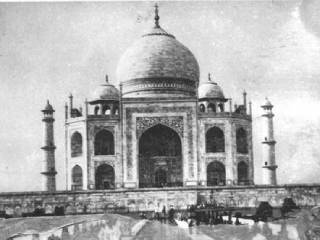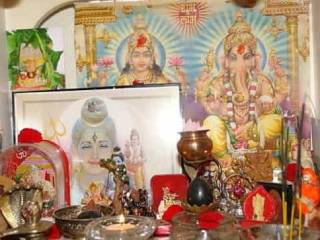Phalgun Krushnapaksha 10, Kaliyug Varsha 5115
 |
In Sino-Indian war of 1962, India was defeated owing to policies adopted by Nehru. The above report of Australian journalist Neville Maxwell has been published by him ‘on line’ as Indian Government kept it as a secret for the last 50 years. It shows that Nehru was anti-national. There are many examples of treachery of Nehru; few of which are given below. Will those, who call Nehru as the pioneer architect of India and as ‘Chacha Nehru’, realize his anti-national attitude and stop glorifying him ?
1.This country got freedom not because of Gandhi and Nehru; but because of revolutionaries !
‘Today, the untrue information given about history of our country is that our country was freed due to two great personalities; viz. Gandhi and Nehru. Does it mean that sacrifice, contribution and martyrdom of revolutionaries and patriots have no value ? It is an insult of bravery, valour and ‘Kshatra-tej’ of revolutionaries if their sacrifices are ignored like this. The verse given below is proof of such insult.
“De dee Hame Azadi bina shatra bina dhal,
Sabaramati ke Sant tu ne kar diya kamaal”
Revolutionaries and freedom-fighters like Swatantryaveer Savarkar, Vasudev Balwant Phadake, Chapekar brothers, Bhagat Singh, Chandrashekhar, Sukhdev, Rajguru, Khudiram Bose and Subhash babu etc. fought with all their might to break the shackles of slavery tied in Bharatmata’s feet. What have the two weapons like truth and non-violence given Hindustan, is divided freedom !
2. India’s 24, 00,000 sq. km of land was grabbed by enemy during 17 years of regime of spinelessness of Nehru
Gandhi and Nehru hated weapons. They wanted Ram but not with His ‘Kodand’. After India’s freedom, Nehru declared, ‘we do not want animosity with any country in the world; therefore, we do not have any enemy and we do not need army and weapons.’ Independent Hindustan suffered due to such strange philosophy of Nehru. During his 17 years of regime, our 24, 00, 000 sq. km of land was grabbed by enemy. Army and arms were neglected and China defeated us in just 7 days. In this war, our 20,000 soldiers had to sacrifice their life and China grabbed our land admeasuring 64 kms.
3. Secularism means throttling ‘Hindutva’
Nehru got a name for himself as secular and thoroughly despised Hindus. Later such despise crossed all bounds and definition of secularism was equal to Hindu- hatred. Therefore, to say or write that ‘Mughals were foreigners; they invaded our country and did injustice to people and oppressed our people; or they propagated Islam on the strength of sword; Shivaji Maharaj slew Afzal Khan and cut off Shahiste Khan’s fingers’ is treated as opposing secularism.
4. Anti-national Nehru honoring those who brought Pakistanis to India in illegal manner and ignored those who complained about it
After Hindustan’s partition, Fakruddin Ali Ahmad brought 14 lakh Pakistanis to India in illegal manner. When complaint was made to Nehru about him, Nehru took the complainant to task and appointed Fakruddin Ali Ahmad as minister in his cabinet of ministers.
5. Trampling ‘Hindutva’, Christians and Muslims were given the status of ‘national minority’
Nehru’s secularism was an attempt to give status of nationalism to the period of invasions by Islam and the British. Swa. Savarkar had stated that Hinduism was the original source of nationalism of Hindustan and which was right; but Nehru disagreed with it. He tried to keep Muslims from the main flow of Hindustan’s nationalism. Christians and Muslims were ‘religious minority’; Nehru gave them the status of ‘national minority’. They were given the freedom of converting followers of other religions to their religion.
6. Money was given to durgahs, mosques and churches from Govt. coffers and giving money to Hindu temples was opposed
Nehru opposed revival of Sorati Somnath temple. He did not approve spending money from Government coffers for revival of temples; whereas he did not object to spending money from the same coffers for mosques, durgahs and churches.
7. ‘Nehru-Vadis’, why were there riots after Babri mosque was demolished and quiet after demolition of Hindu temples ?
Today’s Government is going fast on the same track of ‘Nehruism’. After demolition of Babri Mosque, all these patrons of ‘Nehruism’ showed their bleeding hearts; but when Hindus’ temples are destroyed, bomb blasts occur in their temples, only Hindus die and these people have nothing to show, as they have no heart so no blood.
8. Construction of Ram-mandir is lawful in place of Babri mosque !
Aurangzeb demolished the temple of Kashi- Vishweshwar. It is not right for any sovereign power to do such things; it was right to re-build Kashi Vishwashwar Temple at that place. Similarly, Babur destroyed Ram – Mandir of Ayodhya and built mosque in its place which is also not rightful and it will be appropriate to re-construct Ram-Mandir at that place. Many legal experts and knowledgeable persons say that ‘it is not religious but political matter’.
9. Nehru did not believe that revival of ancient temples was internal matter of a country
Nehru warned Dr. Rajendra Prasad that ‘You are President. If you sit for ‘puja’, our relations with Pakistan and other countries will spoil; when renovation of Sorati Somnath temple was undertaken; however, no country registered protest against renovation of this temple. When Babri mosque was demolished, local Muslims created havoc; but Saudi Arabian Government told her citizens that it was an internal matter of India and nobody would protest against the same.
10. Nehru, who had no interest in having an identity as an Indian, had said, “Renovation / repairs of ancient temples destroyed by anti-Hindus, is like hating existing Muslims !”
No sovereign country keeps remnants of foreign invasions which has caused destruction in that country and doing that, is a sign of having own identity. Anti-Hindus had blown off Hindu temples out of their hatred towards Hindu Dharma and it is the truth but according to Nehru, reconstruction of such temples was like hating today’s Muslims. Narasimh rao was also influenced by such thoughts of Nehru which was proved when he passed a resolution in Parliament that ‘Condition of worshipping centres as existed before 1947 should be kept as it was and no changes should be carried out in them.’ Such resolution shows that Hindustan Government was in favour of the acts of destruction of Hindu temples.
11. By declaring that it was an offence to criticize founders of Dharma, Hindu-hater Nehru offered legal right to Christians and Muslims for trampling Hindus’ religious sentiments
A book titled ‘Religious Leaders’ was published during the regime of Nehru. Muslims made a hue and cry that there was matter in this book which hurt religious sentiments of Muslims. Nehru criticized that part of the book in his public speech and then and there declared, “Criticizing founders of religions should be treated as an offence irrespective of the fact whether such criticism was right or wrong.” Such law was passed.
It means that anyone criticizing Hindus’ worshipped Saints or revered persons would not be an offence; because there is no founder of Hindu Dharma; so Christians and Muslims can legally hurt religious sentiments of Hindus. Such illegal right was conferred upon them by ‘Nehruism’.
12. With encouragement of pro-Christian Nehru, ‘Nagabhumi’ which had only 200 Christians, became ‘Nagaland’ with Chrisitans as its main population
‘Nagabhumi’ was given name of ‘Nagaland’ by Nehru. Christian missionaries declared that people staying in ‘Nagabhumi’ were ‘Nagas’, tribal. In fact, people staying on mountains call mountain as ‘Naga’ and therefore, they were known to be ‘Nagas’. Those worshipping ‘Naag (serpent)’ are also known as ‘Nagas’. It is, however, not the complete truth as people staying in Assam are ‘Nagas’ but they do not worship ‘naag’. Christian missionaries converted these ‘Nagas’. As a result, around 1947, when number of Christians in Nagabhumi was 200, the missionaries converted whole ‘Naagbhumi’. Nehru is responsible for it as he allowed missionaries to go to Nagabhumi. The Christian missionaries told Naga people, “You are not Hindus. Hindus have always done injustice to you and oppressed you. If you become Christians, you will have an independent ‘Nagaland’. The missionaries also told them, “Your independence day is 5th April and you observe that date.”
13. Nehru joined missionaries in eradication of Hindu Dharma and Hindus from Nagaland as he was a Hindu –hater
Nehru disliked Hindi language and Hindus. He supported Christians in eradication of Hindus and Hindu Dharma from Nagabhumi. Nehru propagated that ‘Naga people were against Assamese language, their language was English and their script is also Roman.’
14. During Nagas’ revolt against India, Nehru did not allow army to take action and honored revolting Naga leaders as idealistic
The British gave weapons to Nagas during war for ousting Japanese. Nagas revolted against India on the strength of those weapons. That time, Nehru saw to it that army did not take action against them. Nehru also honored revolting Naga leaders as being ‘idealistic’.
15. Today, it has become difficult to curb terrorists’ activities as Govt. has adopted ‘Nehruism’
Today’s terrorists are able to go scot- free due to such Nehruism principles. People of Human Rights Commission are fighting for release of terrorists. Terrorists’ activities were controlled by England and USA. We have not yet been able to put curb on terrorism and will not do so even in future; because the Government has adopted ‘Nehruism’.
16. Kashmir problem and Nehru
16.A. Pro-Muslim Nehru not in favour of allowing Raja Hari Singh to merge Kashmir with Hindustan as Nehru was angry with him because Hari Singh had imprisoned Sheikh Abdullah : After Hindustan’s freedom, problem of ‘sansthans’ cropped up. ‘Sansthaniks’ had option of either merging with Pakistan or with Hindustan. Kashmir’s Maharaj Hari Singh was ready to merge with Hindustan. Mountbatten was, however, insistent that Maharaj Hari Singh should merge his State with Pakistan; but Maharaj opposed it. Nehru did not vote in favour of Maharaj Hari Singh as he had imprisoned Muslim leader Sheikh Abdullah. Nehru was angry with Hari Singh for this reason.
16.B. Nehru betrayed Raja Hari Singh by not providing help when Pakistan attacked Kashmir : Pakistan started creating problems in Kashmir. Hari Singh asked Nehru for help to prevent Pakistan’s oppression and audacity. Nehru was told that if military action was not taken in Kashmir, it may be destroyed; but Nehru paid no attention.
16. C. Nehru exhibited lack of leadership qualities by using delaying tactics in taking action against Pakistan’s terrorist activities as he was under influence of Mr. & Mrs. Mountbatten; he took the problem to United Nations : Nehru said that it was more important for him to know what people want rather than what Kashmir’s Maharaj wants. If people want, only then Hindustan would take possession of Kashmir and it would be lawful. No country, including Pakistan, wanted that the problem should be solved as per the wish of people of Kashmir. It was easy for Hindustan to put a curb on Pakistan’s terrorist activities; but Nehru whiled away time and unnecessarily took the problem to United Nations. Nehru, later, accepted that he took such decision falling under pressure of Mr. and Mrs. Mountbatten.
16. D. Nehru takes anti-national decision to apply article 370 to Kashmir so that Kashmir did not merge with India : Despite knowing about his committing mistakes one after another, Nehru again committed a big mistake and that is creation of clause 370 under which Kashmir would never merge with India. As per this clause, No Indian has a right to hold property or settle in Kashmir; but citizens of Kashmir can go and settle anywhere in India. Hindustani citizen is not governed by this article and if he wants to own property and stay in Kashmir, Kashmir State Assembly has to approve such proposal.
16. E. Pro-Muslim Nehru changes his own decision to appease Sheikh Abdullah and does not take people’s vote on Kashmir problem : Nehru had created impression before the world that he was a just person by raising the issue of people’s opinion and unnecessarily tried to appease the world; but he never took people’s vote on the problem and appeased Sheikh Abdullah. For appeasement of Sheikh Abdullah, a senior leader, Prime Minister of India changed his own decision.
16. F. Owing to Nehru’s wrong decision, Kashmir’s problem has remained unresolved and the land of Kashmir known as India’s heaven, is stained with blood of thousands of Kashmiris : Nehru’s such decision further worsened Kashmir problem. Local Hindus from Kashmir had to leave their land and property; becoming displaced. Thousands of Hindus were killed. The land known as Indian heaven became stained with blood of Kashmiris. Himalaya, the King of Mountains, resonated with shrieks of women and children.
16. G. Nehru wanted to apply clause 370 even to Hyderabad Sansthan like Kashmir : Nehru wanted to bring even Hyderabad sansthan under the purview of article 370. He had offered article 370 and sovereign power under it to Nizam of Hyderabad; but Nizam wanted total freedom. This proposal of Nizam was not agreed to by Nehru; else like Sheikh Abdullah, another problem would have been created in the form of Nizam.
Such anti-national decisions of Nehru have led to causing harm to Hindustan. We are experiencing it today. Even then, today’s Government is following the same wrong path of Nehru. With a prayer to God that ‘Let God give ‘sattvik’ intellect to them and let it result in Hindustan’s welfare’.
– Shri. Durgesh Jayawant Parulkar (Monthly ‘Dharmabhaskar’, September 2008, page no, 17 to 19)
Source : Dainik Sanatan Prabhat

 Mizoram: EC accepts Christians’ demand to defer counting on Sunday, but what if Hindus had made a similar demand?
Mizoram: EC accepts Christians’ demand to defer counting on Sunday, but what if Hindus had made a similar demand? Sign Petition : Immediately repeal the draconian and unconstitutional ‘The Waqf Act, 1995’
Sign Petition : Immediately repeal the draconian and unconstitutional ‘The Waqf Act, 1995’ Shriram : Sri Lanka’s saviour
Shriram : Sri Lanka’s saviour Why it is so cool to malign Hindu gods and goddesses, but it may not be that easy now
Why it is so cool to malign Hindu gods and goddesses, but it may not be that easy now Shocking Truth of Taj Mahal exposed by Late Pujya P. N. Oak
Shocking Truth of Taj Mahal exposed by Late Pujya P. N. Oak How are Hindus treated in states where they are in a minority?
How are Hindus treated in states where they are in a minority?